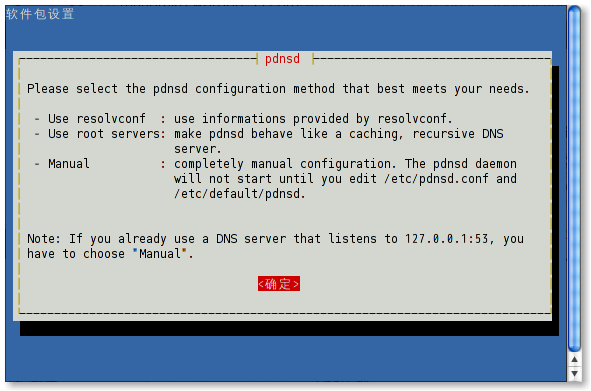Linux下使用pdnsd突破污染
GFW犯贱无非有三招:IP封锁、关键词检测、还有我最痛恨的DNS污染。
关键词检测通常可以使用SSL连接,IP封锁可以用SSH,可是唯独DNS污染比较恶心,它就像粘在鞋底的狗屎一样,总是缠着你不放,这点在使用Chrome+SSH的时候最明显。“诶?我靠,怎么SSH连上了还没法翻出去?”这就是因为查询到的IP仍然是遭到了污染的,不管你用的是流氓的ISP提供的DNS,还是Google Public DNS抑或是Open DNS,你都不太容易搞定这个问题。
在Windows下,你可以使用pydnsproxy防止DNS污染,在Linux下,可以使用pdnsd1。
配置方法很简单,首先就是安装:
sudo apt-get install pdnsd 这时,你就需要配置pdnsd了。
现在,使用你喜欢的文本编辑器打开pdnsd的配置文件,以我的为例。(我已经删除了被注释掉的选项。)
sudo gedit /etc/pdnsd.conf global { perm_cache=16384; cache_dir="/var/cache/pdnsd"; run_as="pdnsd"; server_ip = 127.0.0.1; // Use eth0 here if you want to allow other // machines on your network to query pdnsd. status_ctl = on; paranoid=on; /* 重要!在这里设置查询方法为TCP,就可以避免大部分DNS污染,你也可以设定为 tcp_udp,即在TCP查询无效的情况下使用常规的UDP协议查询。*/ query_method=tcp_only; // pdnsd must be compiled with tcp // query support for this to work. min_ttl=15m; // Retain cached entries at least 15 minutes. max_ttl=1w; // One week. timeout=10; // Global timeout option (10 seconds). } /* 这个部分是设定pdnsd要查询的DNS服务器,本来是查询根域名服务器,我将其修改为了OpenDNS的。 */ server { label="OpenDNS"; ip = 208.67.222.222 , 208.67.220.220; ping_timeout = 300; // Test every half hour. } source { owner=localhost; file="/etc/hosts"; } rr { name=localhost; reverse=on; a=127.0.0.1; owner=localhost; soa=localhost,root.localhost,42,86400,900,86400,86400; } 接下来,配置以启用pdnsd。(我的是编辑/etc/default/pdnsd)
sudo gedit /etc/default/pdnsd # do we start pdnsd ? START_DAEMON=yes # auto-mode, overrides /etc/pdsnd.conf if set [see /usr/share/pdnsd/] AUTO_MODE= # optional CLI options to pass to pdnsd(8) START_OPTIONS= 当一切都完成之后,你要做的便是重启pdnsd服务了。
sudo service pdnsd restart 试试解析一个被污染的域名吧?你未必能够ping得通,因为它的IP可能已经被封锁了。但是得到的结果应该是非常正确的,至少现在是这样。
nslookup twitter.com 127.0.0.1 现在搭配gSTM连接SSH(gSTM是GNOME下的SSH端口转发的图形界面前端,很好用。),加上设置127.0.0.1为你的DNS服务器(以后理论上开机pdnsd就启动了,一劳永逸。),Government’s Fucking Wall就不会影响你的上网了。
Enjoy it, and say FUCK OFF to DNS poisoning!
pdnsd is a proxy DNS server with permanent caching (the cache contents are written to hard disk on exit) that is designed to cope with unreachable or down DNS servers (for example in dial-in networking). Since version 1.1.0, pdnsd supports negative caching. ↩︎

